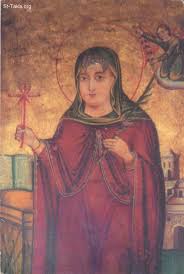القديسة أفروسينا
(١٧ فبراير / ٩ أمشير)
Saint Afrosina
(17 Feb / 9 Amshir)

Life of the Saint
She lived in the late 13th and early 14th centuries. She lost her parents at a young age, and a devout family took her in and raised her, nurturing her in a life of spiritual growth and love for asceticism.
When she sensed that a young man wished to marry her, she "shaved her head," which affected the young man who had grown attached to her. He admired her virginity and dedicated his life to the Lord after seeing her devotion.
Because of her insistence on living a chaste life and the Lord's manifestation in her life, the family that raised her presented her to the monastery. There, she grew in asceticism and vigil, longing to wear the angelic monastic habit. God also granted her the gift of performing miracles.
After the abbess stepped down, the nuns agreed to appoint her as their superior or mother, especially because of her ascetic life, her vigils, her love for giving, and her spirit of humility and wisdom. Everyone sought her company and advice. In her leadership, she was distinguished by deep love and cheerfulness, allowing each nun to find true comfort in Christ through her guidance.
The Church faced severe trials during her time, as Christians were expelled from the government offices. She became a support for these suffering families, using her loving heart and cheerfulness to help them, and she brought many souls back to the faith.
Finally, she suffered from illnesses for a long time and fell asleep in the Lord on the 9th of Amshir, 1024 A.M., at the age of eighty. Pope John VIII attended her passing.
Her Famous Words:
“It befits one who desires the salvation of their soul to give silver to those who insult, humiliate, or grieve them, in order to gain the virtue of humility.”
“The Kingdom of God is not acquired by gold or silver, but by humility, purity of heart, and sincere love for everyone.”
سيرة القديسة
عاشت في أواخر القرن الثالث عشر وبداية القرن الرابع عشر. فقدت والديها وهي صغيرة، فتولت إحدى العائلات التقية تربيتها، فنشأت في حياة تقوية، محبة للنسك.
إذ شعرت بأن شابًا يتقدم لزواجها "حلقت شعر رأسها"، الأمر الذي أثر في نفس الشاب الذي كان قد تعلق بها، فأحب البتولية وكرس حياته للرب لما رآه في هذه الفتاة.
أمام إصرار الفتاة على الحياة البتولية، وتجلي الرب في حياتها، قدمها الذي قام بتربيتها للدير، فازدادت نسكًا وسهرًا، وكانت تشتاق أن ترتدي الزي الملائكي الرهباني، وقد وهبها الله عطية عمل المعجزات.
إذ تنحيت رئيسة الدير، اتفقت الراهبات على إقامتها رئيسة أو أمًا عليهن، خاصة أنها اتسمت بجانب نسكها وسهرها وحبها للعطاء، وتمتعها بروح الحكمة في اتضاع، فكان الكل يشتقن لمجالستها وطلب مشورتها. تميزت في رئاستها بالحب الشديد والبشاشة، فكانت كل راهبة تجد راحتها الحقيقية في المسيح خلال هذه الأم.
مرت الكنيسة بضيقة شديدة في أيامها إذ طُرد المسيحيون من الدواوين، فكانت سندًا لهذه العائلات المتألمة، واستطاعت بقلبها المحب وبشاشتها أن تسند هؤلاء المضطهدين وتعينهم، كما ردت نفوس كثيرة إلى الإيمان.
أخيرًا عانت من الأمراض زمنًا طويلًا، ورقدت في الرب في التاسع من أمشير عام 1024 ش، بالغة من العمر ثمانين عامًا، وقد حضر البابا يوحنا الثامن انتقالها.
من كلماتها المأثورة:
يليق بمن يود خلاص نفسه أن يعطي فضة لمن يشتمه ويهينه ويحزنه، حتى يكسب فضيلة الاتضاع.
ملكوت الله لا يُقتنى بذهب أو فضة إنما بالاتضاع ونقاوة القلب والمحبة الصادقة لكل أحد.